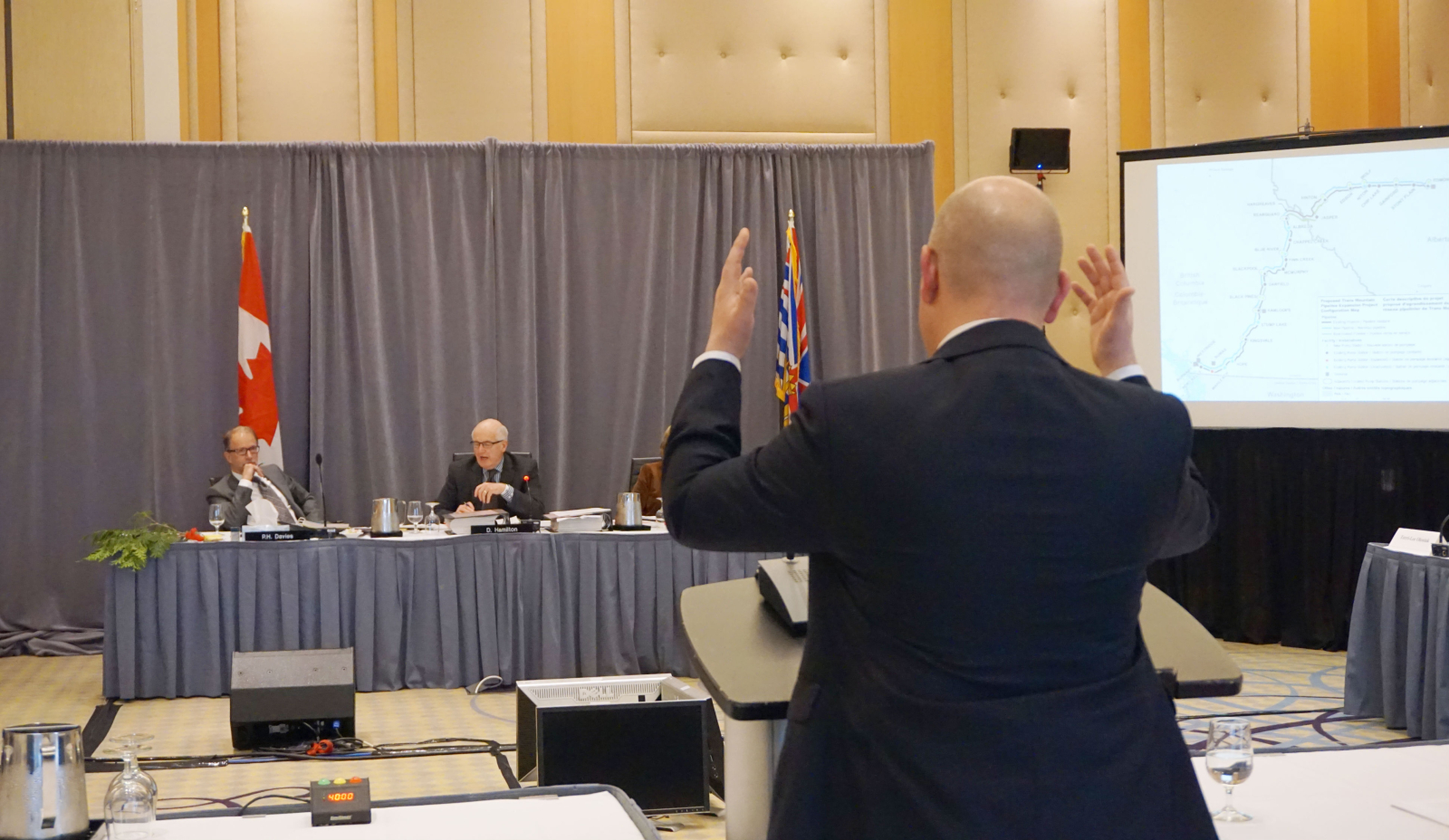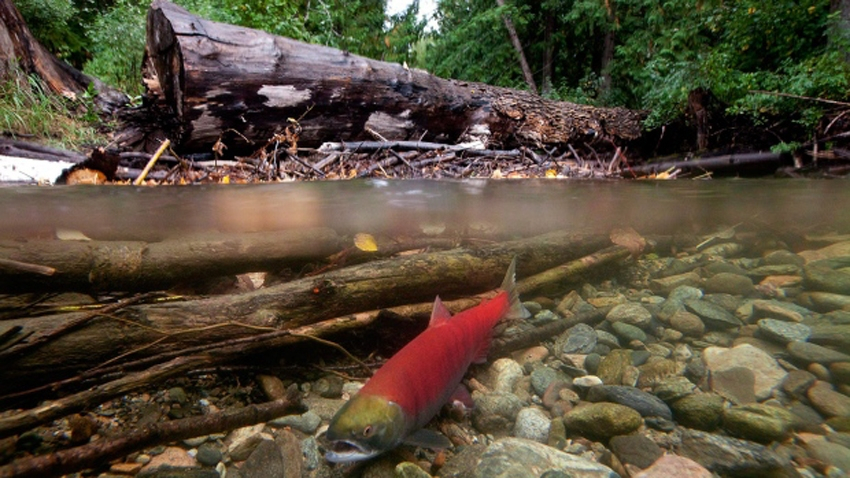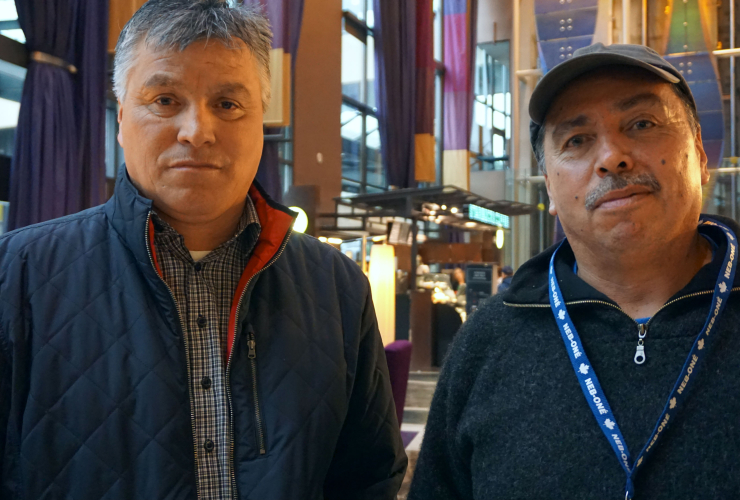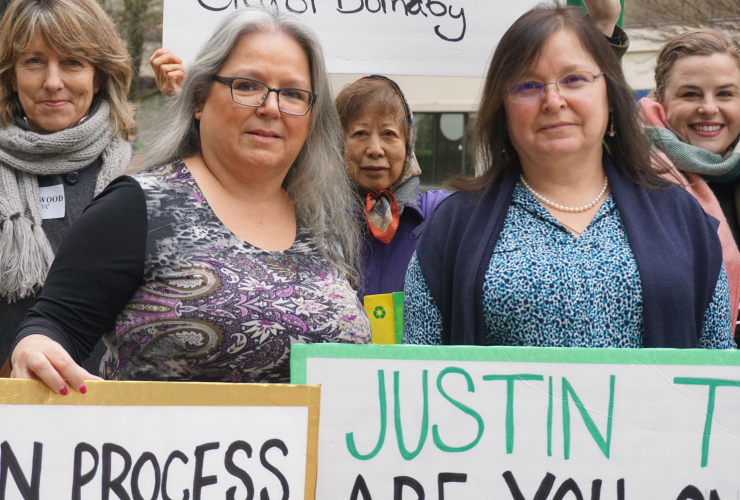To Adam Olsen, deputy leader of the B.C. Green Party and member of the Tsartlip First Nation, the sockeye salmon are like family. Their lineage is sacred and their protection is an honoured, inherited responsibility. He even has an image of salmon emblazoned on his wedding ring.
"It is something I associate with so closely," he told National Observer. "I grew up on a guide fishing boat with my dad, a sports fisherman, in the Saanich Inlet."
Olsen presented intervener at the National Energy Board (NEB) hearings for the Kinder Morgan Trans Mountain pipeline expansion on Friday in Burnaby, B.C. His speech, delivered with pointed fingers and arms in the air, was so passionate that it even broke the poker faces of the panelists into an unmistakable smile.
Arms in the air, he demanded to know why the NEB would even entertain the idea that oil — now with plummeting prices — was worth more than B.C.'s sockeye salmon.
He presented not as a politician or a member of the Tsartlip First Nation however, but as an Indigenous individual with individual rights that he argued, should be considered a separate matter from the rights of his nation.
A colonial consultation construct
"To understand aboriginal rights only as group rights is not correct in my case and it does not align with the rights my ancestors were promised," he told NEB panelists, citing the historic Douglas Treaty, which was signed in the mid to late-1800s by the heads of families and not entire Indigenous communities.
"I understand that it is quicker and easier for to lump us together into groups that were constructed by the Government of Canada," he said, "and only negotiate with one representative per group."
This however, is an "impoverished understanding" and a "simplistic and unjust approach" to rights and consultation, yet one taken up by whole-heartedly by Trans Mountain in its stakeholder engagement for the project, he said.
If approved, the $5.4-billion expansion would triple the capacity of a pipeline system that transports roughly 300,000 barrels per day of crude oil and refined petroleum from the oil sands in Alberta to refineries and marketing terminals in Greater Vancouver and Washington. It would increase tanker traffic in the Salish Sea approximately seven-fold, cutting through vital salmon fishing grounds for Saanich people like Olsen.
"I have commercial rights," he told panelists. "The shipping routes are in direct conflict with the fishing grounds."

Salmon run at risk
This isn't the first time Olsen has engaged Kinder Morgan on his inherent Indigenous right to fish in the territory of his ancestors — last year during an NEB hearing for the project in Chilliwack, B.C., the Texas oil giant questioned how much the fish province's Indigenous people actually consume, despite hours of oral testimony on the salmon's vitality to Indigenous culture and livelihood.
Olsen then launched a social media campaign called "Show Kinder Morgan your Food Fish!" resulting in an influx of nearly 1,000 photos showing the importance of salmon to Indigenous people in B.C. and the province at large. Ninety-five per cent of the images, he reported, were from the 2014 salmon run.
"I am putting our commercial interests on the table because we have always actively traded salmon — for blankets, for foodstuffs, for money," he told panelists. "We were a vital part of the provisioning of the first Europeans that were here."
As an aside, he told National Observer that it was only after this campaign gained social media traction that Kinder Morgan would engage him as an individual stakeholder.

Prioritizing the interests of a corporate giant
Despite having intervened as a private citizen and not a member of the B.C. Greens, Olsen couldn't help but quote federal party leader Elizabeth May, who yesterday highlighted the "frailty of evidence" put before the NEB panel by Kinder Morgan. He lamented the frailty of the evidence he had submitted, but argued that this weakness was an intended result of the Texas-based oil giant's poor stakeholder engagement and the exclusivity of the NEB hearing process.
The NEB Participant Funding Program provides modest amounts of money to interveners to facilitate the participation of the public in hearings with respect to major energy projects. Given that Olsen belongs to a First Nation that has already received program funding however, he was denied a bursary and left to cover the costs of presenting on his own.
These expenses included research, travel, and time away from work. He was unable to hire a lawyer.
"Let me be clear," he told them. "If you recommend approval of this project, you will be allowing this corporation with no constitutional rights to my fishing areas — our fishing areas — to trump my constitutional rights because they have more financial resources than I have."
WATCH: "Stand up and be heard" on energy projects
If you don't participate in public processes when you can, said Olsen, projects get passed without your consent. Video by Devyn Brugge.





Comments